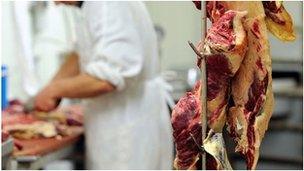Dog food meat 'ended up in human food chain' says report
- Published

Meat meant for dog food is believed to have ended up in the human food chain
Meat meant for dog food is believed to have ended up in the human food chain in an "industrial-scale" fraud carried out in Northern Ireland, a government report has found.
The Elliott Review into food supply said the fraud came to light in 2005.
However, because of a lack of what it said was "investigative resource", it was not pursued.
The report said the potential profit on about 1,000 tonnes of meat found was in the region of £3m.
The case study is included in a wide-ranging report published on Thursday, 12 December. It was written by Queen's University academic Prof Chris Elliott and makes a series of recommendations about ways to prevent food fraud.
It said UK customers had "access to perhaps the safest food in the world", but said government should consider a new food crime unit to help prevent a repeat of the horsemeat scandal earlier this year.
The report did not state where in Northern Ireland the so-called "Category 3 meat" was found, but it was located after officials traced a suspicious container that had arrived in Northern Ireland from Asia.
'Criminal planning'
That led to a follow-up operation at an unnamed cold store. The police were involved and the discovery of an industrial shrink-wrapping machine and forged veterinary documents raised concerns.
The report said it became evident "that the primary business of the cold store was repacking and re-labelling as fit for human consumption Cat 3 ABP meat".
Category 3 ABP meat is defined by government as meat that has been passed fit for human consumption but which is not intended to be eaten. It may include hides, hair, feathers and bones.
The Elliott Report found that at the cold store there was evidence of "extensive criminal planning".
"At that time (or currently) there was no capacity for the major criminal investigation that the evidence and the criminal profits justified," the report said.
The meat was seized and condemned by a magistrates court but the report said the "many leads that were opened up into food crime networks at the time were not followed up".
- Published12 December 2013